 |  |
By Martina
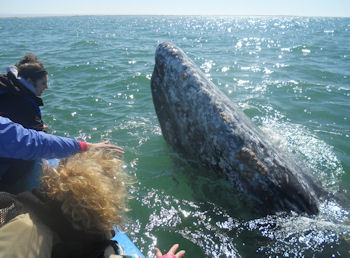
Chilly darkness and chips of stars greeted me as I opened the door onto the predawn sky. This day was to be my first encounter with Baja California’s gray whale. My friend Colleen and I moved in quiet anticipation, as we packed up her Jeep for the long trek out to the San Ignacio lagoon. In search of a good cup of coffee we find no place open this early. We wind our way through the sleeping community to find the road beautifully paved making the first 45 minutes smooth and easy. The last 19 miles slow us down to a crawl over teeth shattering washboard and in places deep sand drifts.
The wind is blowing fiercely and I am just a bit concerned about the boat ride on choppy water. I pop a Dramamine to be safe. As the sun rises we are able to see this very flat and desolate landscape. It was once the sea bottom from an ancient past. The salt flats have other worldly colors rimmed with crusty white of pure natural salt. The strange sandstone forms appear to rise up from the ground; these once had sea creatures swimming around them.
Pulling into the Kuyima compound at the edge of the lagoon, we first saw a number of Osprey nesting poles built specifically to serve this large beautiful raptor. I was quietly shocked to see the rolling waves all the way out to the horizon, and the pangeros waiting to take us out were dressed in yellow rain slickers. Yeh, I was definitely not seaworthy. But after so many years of listening to other people’s accounts, I would have tackled anything. The Kuyima Indians have set up as much comfort as is possible under the conditions and I finally found my morning coffee offered free in the cafeteria. It was by far the best cup of coffee I have ever had, hot and mellow.
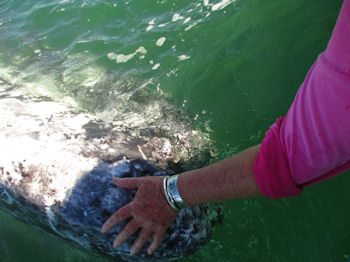
It was time to commit. One of the volunteers helped us put on our life jackets over the top of several layers of clothing, I felt like the puffy dough boy. I popped another Dramamine, while Ernesto gave us the dos and don’ts, one of which was not to fall overboard! We learned that in February there were a total of 300 whales which included the new births. By March, the males and newly pregnant females were leaving. Two hundred birthing mothers and the calves remained. While they linger into early April, the mothers teach their babies a number of different things like how to scoop brine from near the bottom of the lagoon, preparing them for their long swim north. A 20th century lesson for the young ones is that of being introduced to the human species.
There is a low hum of excitement from those of us who are waiting for the moment to embark upon this journey. We approach the pangas bobbing up and down, and I recall stories from friends about the perfect breezeless weather and the lagoon’s surface being like glass. Alas, I was to have a different story to tell. Fernando grabbed my hand and I gracelessly fell into the boat. We all settled in for the wild ride. The thoughts going through my head were a jumble. I was sharing the water with these creatures we could never really know and would never know the world they lived in; especially swimming 5,000 miles from Alaska to Baja Sur while pregnant. The spouts of water were visible but still a ways off, making it even more exciting being forced to wait for first contact. From a distance they sounded like hollow wood instruments blowing air as the giant plumes of mist shot into the sky.
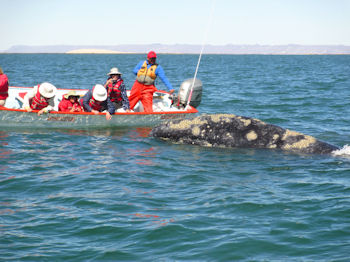
Here was the moment. Fernando slowed the engine to an idle. A tremendous hulk could be seen swimming underneath the boat. Its 45-foot length moved under us for what seemed a lifetime. Slowly the mammoth’s head came up beside the boat. A sudden swell lifted us at the same time everyone lurched to the whale-side of the boat. Thoughts of capsizing flashed in my mind. The Captain had his job cut out for him. We all wanted to touch and be touched by this profound experience. Speaking all at once we begged her to come closer. Her giant head was nearly as long as the boat and she looked at us with quiet serenity, while we humans were chattering like noisy gulls. She had swum 55 days straight without stopping, gave birth to a baby weighing a ton and was here to greet our motley crew.
Her skin felt like smooth rubber, but not cold; a truly otherworldly sensation. There is no doubt that this mother is a sentient being. Whale mothers go against the pure animal instinct of protecting their babies and keeping them out of harm’s way. These mothers actually bring their babies to the boat. Why? The only answer it can be is it is part of the babies’ training and the young whales love it. How do we know? What I experienced and many report is the playful nature of both mother and baby. This day the baby rose from the water near me, with intention, it turned its head just enough to spray water out of its blow hole right at me, making me laugh with delight. I’ll be so bold as to report, they love making the humans laugh.
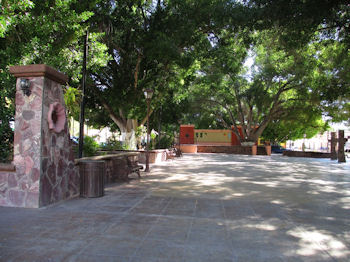
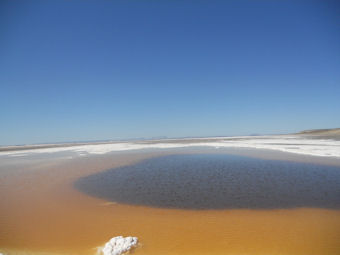
Ecoturismo, Kuyima’s office is at the corner of the central plaza.
Info(at)Kuyima.com
615-154-0070
Martina's email: mteomaya(at)gmail.com